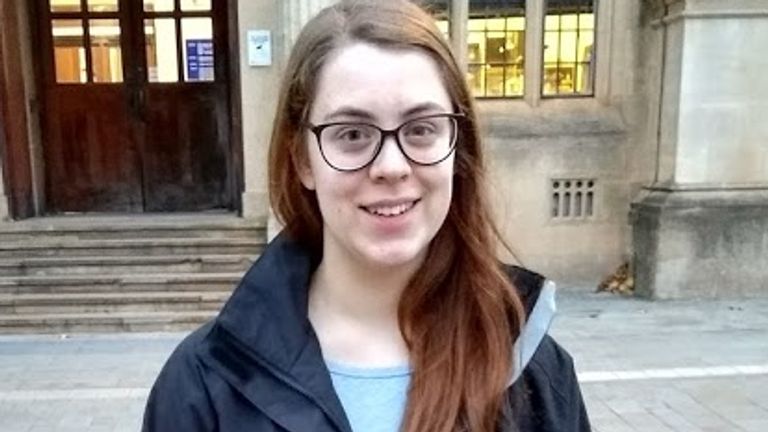Online Safety Bill campaigners join forces to urge next prime minister to prioritise new legislation | UK News
A group of campaigners, survivors and families affected by abuse on social media have written to the Tory leadership candidates to urge the next prime minister to prioritise the Online Safety Bill.
Danielle Armitage is one of those who have signed the open letter addressed to the candidates.
She was only 14-years-old when she was groomed while playing an online interactive game for children.
The man claimed to be 16 years old, however he was in fact in his late 40s at the time.
Ms Armitage, who has waived her anonymity to warn others about what happened to her, told Sky News that initially “he arranged to meet me after school”.
“I got into his car and discovered that he was a lot older than what he said. I just froze from that point,” she said.
He drove Ms Armitage to a forest, and that’s when the first sexual assault took place.
The situation then “escalated”, and subsequent assaults became more violent.
Ms Armitage said: “He said if I spoke out or told anybody, he’d threaten my family. I felt like I had to see him again.”
She added: “By coming together and speaking out, we want the next prime minister to know what happened to us was avoidable.
“It’s in their hands to protect our children, and to make sure there are safety measures in place for children using the internet.”
Campaigners are calling on Liz Truss and Rishi Sunak to resist calls to water down the planned internet safety laws and commit to delivering them without delay.
The proposed legislation had been scheduled to make its way through parliament before the summer recess but, due to competing demands in the chamber, has now been delayed until a new prime minister is in place.
It aims to regulate social platforms, to ensure they protect their users from harmful content, with fines and other potential penalties for those who fail to do so.
There are concerns in some quarters that the bill will damage free speech and enable censorship, while others believe it does not go far enough to curb the spread of harmful material online.
In their letter, the campaigners said it is “upsetting” to see some opponents of the bill “rejoicing at this delay and calling for the legislation to be scrapped altogether”.
The coalition is made up of 15 grooming and sexual abuse survivors, and parents of children who died by suicide after seeing harmful content online.
“We have long campaigned for laws to better protect children online and were frustrated and disappointed to see the Online Safety Bill delayed rather than pass through parliament last month,” the letter reads.
“With every month the legislation is delayed, the NSPCC say we will see more than 3,500 online child sexual abuse crimes against children. These offences have increased tenfold in just a decade. And bullying, pro-anorexia posts, harmful self-harm and suicide content continue to fill children’s streams.
“This level of harm against children would not be accepted in any other industry, which is why the next prime minister must make the Online Safety Bill a national priority and pave the way for urgent regulation to begin.”
Follow the Daily podcast on Apple Podcasts, Google Podcasts, Spotify, Spreaker
Concerns have been raised by experts on all sides of the debate around the bill after changes in government and ministers with different priorities overseeing the legislation.
In their letter, the campaigners insisted Ms Truss or Mr Sunak must move forward with the bill.
“Should you become the next prime minister, we urge you to keep the promise made to children and families and deliver a robust Online Safety Bill in full and without delay,” they said.
“Any watering down of the bill would be unacceptable and break the commitment made to children and families in the Conservative Party manifesto to deliver the strongest possible protections for children online.”


